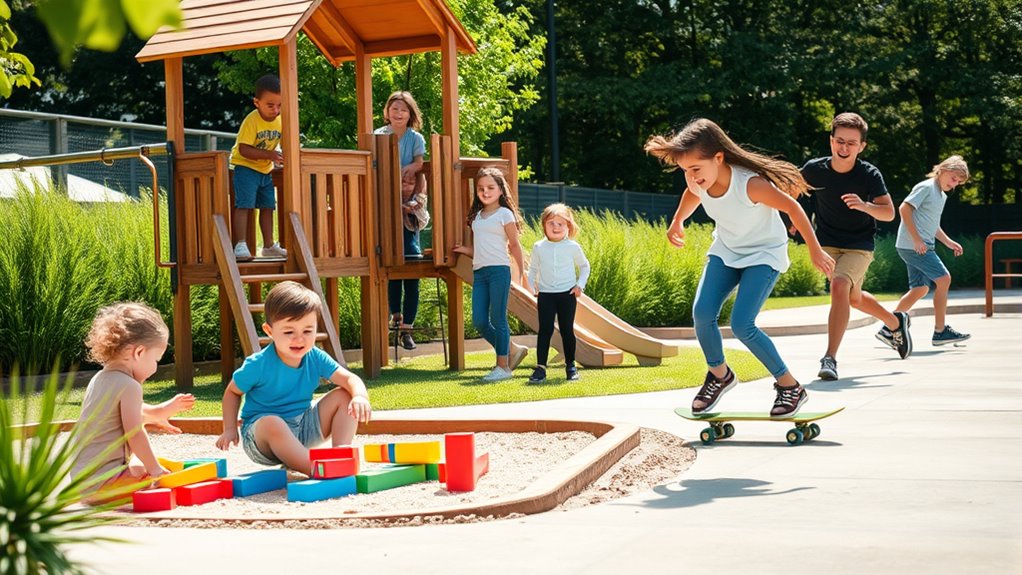Play is essential for your child’s development and varies with age. Young kids benefit from physical play to build motor skills, while imaginative activities foster creativity. Social play teaches cooperation, and digital games can boost problem-solving if managed well. Creating safe, engaging environments for each type helps children grow in confidence and independence. If you want to discover how to support your child’s play at every age, exploring further can give you helpful ideas.
Key Takeaways
- Play supports holistic development, including physical, emotional, social, and cognitive growth at different ages.
- Different play types, such as physical, imaginative, and digital, cater to specific developmental needs.
- Age-appropriate play environments promote safe exploration and confidence building for children.
- Engaging in varied play activities fosters skills like problem-solving, creativity, cooperation, and independence.
- Balancing physical, social, creative, and digital play ensures comprehensive growth throughout childhood.

Have you ever wondered why play is so crucial for children? It’s more than just a way to pass the time; it’s a essential part of their development. When you think about play, it’s easy to picture kids running around a playground, climbing, swinging, and exploring. But for play to be truly beneficial, playground safety must always be a priority. Knowing how to keep playground equipment in good condition and supervising children effectively helps prevent accidents and injuries. Safe play environments give children the freedom to explore and learn without unnecessary risks, building their confidence and independence along the way.
Play is essential for development; ensuring playground safety helps children explore confidently and learn without unnecessary risks.
At the same time, play isn’t limited to outdoor activities. Digital gaming has become a significant part of children’s playtime, especially as technology advances. While digital games can be incredibly engaging and educational, they also come with concerns about excessive screen time and the potential for overuse. It’s important to strike a balance, encouraging children to enjoy digital gaming in moderation while still engaging in physical, social, and imaginative play. When managed well, digital games can improve problem-solving skills, coordination, and even foster social interaction through multiplayer platforms. But, as with all forms of play, setting boundaries ensures that digital gaming complements other developmental activities rather than replacing them.
The different types of play serve specific developmental purposes at various ages. For young children, physical play—whether on a well-maintained playground or through imaginative activities—helps develop motor skills and sensory awareness. As children grow, social play becomes increasingly important, teaching them cooperation, negotiation, and empathy. For older children and teenagers, strategic and digital gaming can boost cognitive skills like critical thinking and planning, but it’s essential they balance these activities with physical and social interactions.
No matter the type of play, safety remains a cornerstone. Ensuring that play environments are safe and appropriate for each age group helps children thrive without unnecessary risks. Additionally, understanding the importance of projector technology in creating engaging environments can extend to designing safe and stimulating play areas. Encouraging a variety of play experiences—outdoor, social, creative, and digital—supports holistic development. When you provide children with safe, engaging, and well-rounded play opportunities, you help them develop physically, emotionally, and socially, laying a strong foundation for their future growth. Ultimately, play is not just a leisure activity; it’s a fundamental part of childhood that shapes confident, capable, and well-rounded individuals.
Frequently Asked Questions
How Does Play Influence Childhood Brain Development?
Play markedly influences your child’s brain development by boosting cognitive growth and emotional resilience. When your child engages in play, they explore new ideas, solve problems, and develop critical thinking skills. Play also helps them manage emotions, build resilience to stress, and develop social skills. By encouraging varied play experiences, you’re supporting their brain’s wiring, fostering both mental flexibility and emotional strength essential for lifelong success.
What Are the Best Types of Play for Teenagers?
You should encourage teenagers to engage in socialization activities and risk-taking games. These types of play help them develop essential social skills, build confidence, and learn to assess risks in a safe environment. Participating in team sports, group challenges, or adventure games fosters peer connections and emotional growth. By balancing fun and safety, you support their overall development while allowing them to explore and take healthy risks.
Can Play Help Improve Social Skills in Adults?
Yes, play can definitely help improve your social skills as an adult. Engaging in activities like team sports, group games, or creative workshops promotes adult bonding and encourages social engagement. These playful interactions help you develop communication, empathy, and teamwork. By participating regularly, you’ll build stronger connections, boost your confidence, and create a more supportive social circle, making your social skills sharper and more natural over time.
How Does Digital Play Compare to Traditional Play?
Imagine diving into vibrant virtual environments where digital play sparks your curiosity, but remember, too much screen time can diminish natural interactions. Compared to traditional play, digital experiences offer endless variety and accessibility, yet they lack the tactile and social richness of face-to-face interactions. While digital play enhances certain skills, balancing it with traditional activities ensures you enjoy the full spectrum of benefits, fostering well-rounded development.
Are There Specific Play Activities for Seniors to Maintain Health?
You can maintain your health through senior leisure activities like active recreation, which boost your strength and flexibility. Try walking, swimming, or gentle yoga to stay active and engaged. Participating in group exercises or dance classes also promotes social connection and mental well-being. These activities are tailored for seniors, making it easier to enjoy the benefits of staying physically active while having fun and improving overall health.
Conclusion
As you watch children laugh and chase butterflies in the sunlight, you realize that play paints their world with vibrant colors and endless possibilities. Whether they’re building castles or imagining adventures, each moment sparks curiosity and growth. Play isn’t just fun—it’s the foundation for their dreams and confidence. So, let their laughter echo and their imaginations soar, knowing that every game they play shapes a brighter, more confident future.









